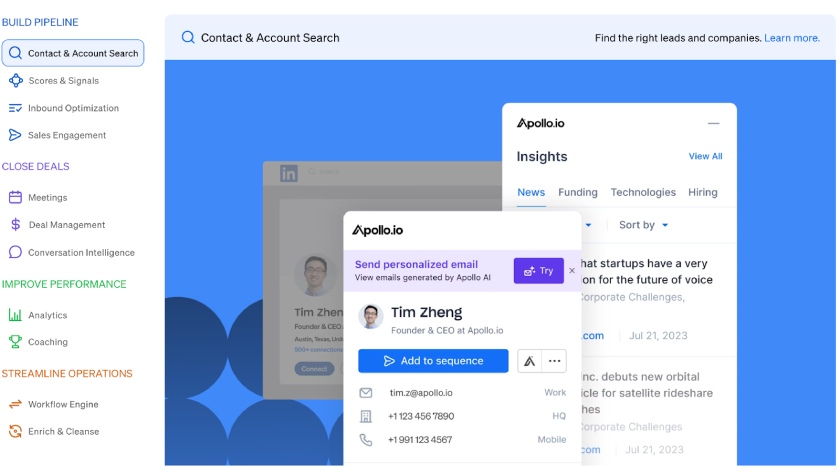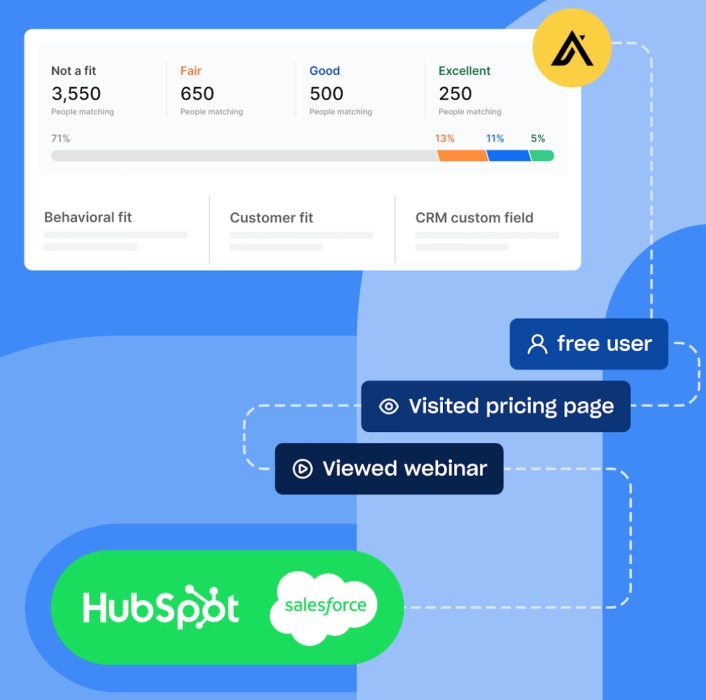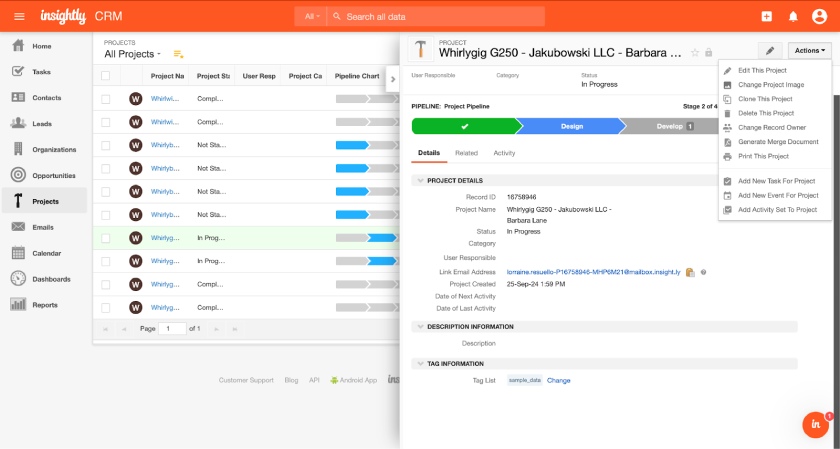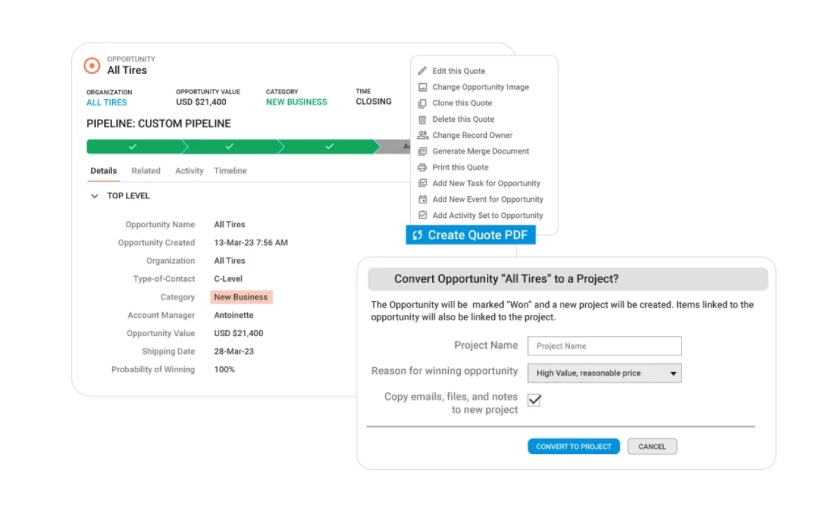If you’re looking for the best customer relationship management (CRM) software that can help boost your team’s productivity, improve customer retention, launch your marketing campaigns more cost-effectively, and increase your sales, you’ve come to the right place. The right CRM for small businesses seamlessly stores contact data, generates and manages leads, and automates business processes in a centralized platform.
We reviewed and compared several platforms to identify the nine best CRMs for small business teams for their features, ease of use, pricing, and other factors to help you make an informed buying decision.
- HubSpot CRM: Best for small business operations
- Pipedrive: Best sales automation tools
- monday CRM: Best easy-to-use CRM for beginners
- Bitrix24: Best for ecommerce
- Capsule CRM: Best artificial intelligence (AI) tools for emails
- Apollo.io: Best for affordable lead management tools
- Bigin by Zoho CRM: Best for startups and solo users
- Insightly CRM: Best for project management
- Copper CRM: Best productivity tools for Google users
Take your business to the next level with HubSpot: an all-in-one CRM featuring an intuitive interface, powerful features, and unmatched scalability. |

|
Featured Partners
Best CRM for Small Businesses Compared
Which small business CRM is best for you?
HubSpot CRM: Best CRM for Small Business Operations

Pros
- It has Free plan for two users (with sales, marketing, and service tools).
- Modern design makes it simple to operate and navigate.
- It has advanced marketing capabilities, like A/B testing and content creation tools.
Cons
- Advanced reporting and analytics require third-party integrations.
- Lower count sales pipelines are more expensive compared with competitors.
- Payment processing is locked in the Starter plan ($15 per user, monthly).
- You want free sales, marketing, and service modules: HubSpot CRM is one of the best free CRM software solutions available on the market. It allows up to two users to access sales, marketing, service, and content management features. If you’re a startup or have a small business with a limited budget, you can use its mass email, third-party integrations, ad management, and support ticket features without spending a dime.
- You need an intuitive and easy CRM for small business teams: HubSpot CRM is one of the simplest CRM systems, as users—even those new to the CRM world—can quickly figure out how to use its features. It uses a modern layout and intuitive navigation system, making it easy to move between modules and operate the tools.
- You need robust marketing features: HubSpot CRM is a marketing automation platform and a CRM system, so it’s ideal for marketing agencies and teams that need high-level marketing features. The platform includes mass email, ad management, a landing page builder, social media management, A/B testing, and the ability to host a blog and on-demand video library.
- You need advanced reporting and analytics tools: HubSpot CRM is an all-around CRM for small businesses. But this CRM only offers basic reporting like email health reporting and sales forecasting. If you want a more in-depth analysis of lead generation and revenue data, you’ll need additional integrations.
- Alternative: Bigin by Zoho CRM is a solid choice for its customizable reports with CRM data insights. Or use Copper CRM for cross-record reporting (on any field) and advanced reporting tools for insight creation and custom fields. Plus, you can send, automate, and schedule your reports.
- You need multiple pipelines for your growing small business: HubSpot CRM’s freemium plan only has one deal pipeline. Its most basic plan, Starter ($15 per user, monthly), only has two. While you can get up to 15 unique pipelines in the Professional plan ($1,170 per user, monthly), it can be more expensive for startups.
- Alternatives: Pipedrive offers customizable, unlimited sales pipelines, making it one of the top customizable CRMs. In the same way, monday CRM offers unlimited customizable pipelines on its first tier. And we recommend Bigin by Zoho CRM for solopreneurs and startups. It gives you up to five team pipelines and 25 subpipelines in its Premier plan ($12 per user, monthly).
HubSpot CRM Pricing Plans*
*Pricing is based on annual billing on a per-user, monthly breakdown of HubSpot Customer Platform. Monthly billing and Enterprise plans are also available for a higher cost. We update pricing information regularly but encourage readers to check current pricing.
**Customer Platform includes sales, marketing, customer service, content management system, and operations software. Individual modules can be purchased for lower monthly costs.
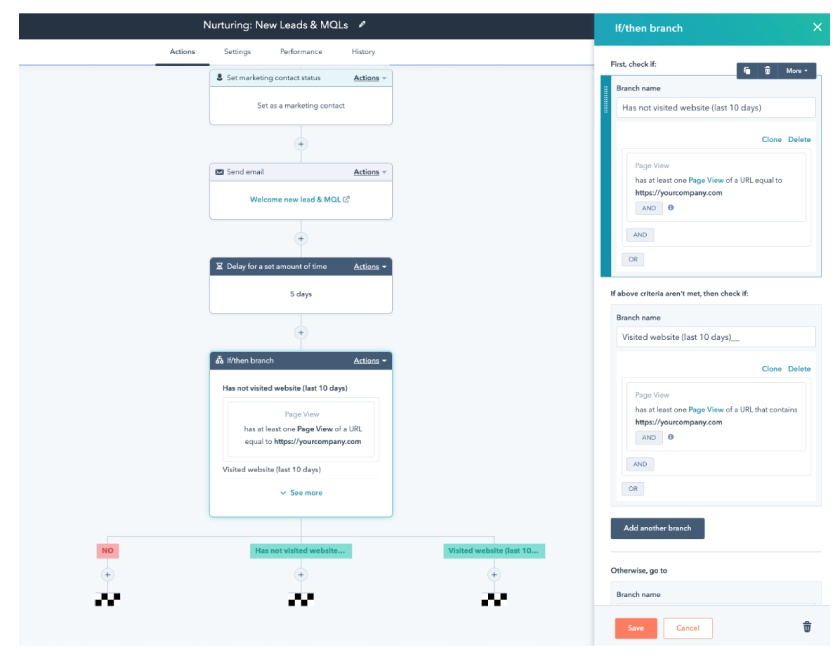
HubSpot CRM’s automation workflow for lead nurturing helps sales reps close more deals. (Source: HubSpot CRM)
Our Expert Opinion
HubSpot CRM is a top B2B CRM system and the best CRM for small business teams overall. Without spending a dime, you can access its comprehensive sales, marketing, and customer service tools, as well as advanced marketing tools. It exhibits excellent platform usability ratings—crucial in customer relationship management for a small business.
Pipedrive: Best CRM Software for Small Businesses That Need Sales Automation Tools

Pros
- Sales automation tools, including end-to-end lead generation, enrichment, and autodeal management, are offered.
- It has robust business proposal features like templates, digital documents, and electronic signature.
- It has low-cost AI tools for analytics and performance recommendations.
Cons
- It has no free plan, only a 14-day free trial.
- Email tools like two-way email sync are locked in a higher plan (Advanced at $34 per user, monthly).
- It lacks client management functionalities (limited to contact activity tracking and file attachments).
- You’re looking for a robust sales automation tool: Pipedrive is one of the best sales automation software tools. Teams prioritizing direct outreach for growth benefit from features like business proposal management, deal rotting, and autocontact enrichment.
Pipedrive is also equipped with sales collaboration, data management, and deal tracking tools for creating a more solid lead database and closing more sales. You can also customize its dashboards, templates, and pipelines to improve your sales process.
- You submit many business proposals and bids: Pipedrive is known for its robust proposal features. This is one of the best CRM software for small businesses that comes with autofillable templates. It pulls CRM data into sales documents for a quick generation process.
Use its Smart Docs to autofill, send, and track sales quotes and proposals, along with its built-in e-signature capabilities to get fast contract approvals. This capability further improves your sales processes to win more deals.
- You need a free-forever plan: Pipedrive is an affordable CRM software for small businesses with excellent sales goal tracking and automation features, but it doesn’t offer a free plan. So it’s unsuitable for individuals or small teams who aren’t ready to commit to a paid subscription.
- Alternatives: Bitrix24 offers free-forever plans that support unlimited users. HubSpot CRM has a freemium plan for two users with sales, marketing, customer support, content, operations, and commerce tools included. On the other hand, Bigin by Zoho CRM offers free-forever tools like a built-in telephone and Bigin Gmail add-on for better communication.
- You want low-cost email features: Pipedrive’s email sync tools for sending, receiving, and tracking emails from the CRM are not available until the Advanced plan for $34 per user, monthly.
- Alternative: HubSpot CRM offers solid email tools for free. Bigin by Zoho CRM provides mass email, email insights, and automation and attachments in emails on its most basic plan (Express plan for only $7 per user, monthly). Apollo.io offers 10,000 email credits per account, monthly, a Gmail extension, and Gmail and Microsoft integrations starting in its free plan.
Pipedrive Pricing Plans*
Pipedrive Add-ons:
- Projects Project management tools, free with Power and Enterprise plans : Starts at $6.70 per user, monthly
- Campaigns Customizable email campaigns : Starts at $13.33 per company, monthly
- LeadBooster Lead generation tool set (chatbot, live chat, prospector, web forms, and appointment scheduler) : Starts at $32.50 per company, monthly
- Smart Docs Trackable quotes, proposals, and contracts; free with Professional, Power, and Enterprise plans : Starts at $32.50 per company, monthly
- Web Visitors Web tracking and lead ranking : Starts at $41 per company, monthly
*Pricing is based on annual billing on a per-month breakdown. Monthly billing is available for a higher cost. While we update pricing information regularly, we encourage our readers to check current pricing.
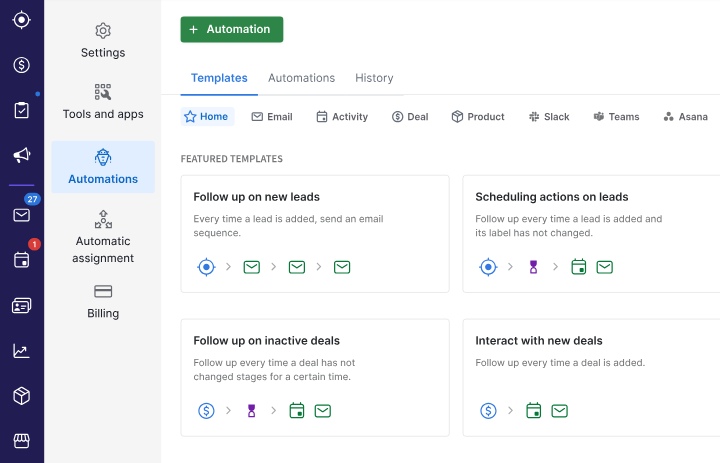
Pipedrive sales automation includes featured email templates that reps can use to easily follow up with sales leads. (Source: Pipedrive)
Our Expert Opinion
Pipedrive is notable for its customizable dashboards and pipelines—making it one of the top customizable CRMs—and sales automation tools like Smart Docs with autofill templates for sales documents. It can help enhance your sales management efforts with its smart features and automated data enrichment for lead generation. You can streamline your tasks and deal with its data-based recommendations via its AI sales assistant.
monday CRM: Best CRM With an Intuitive Interface for Beginners

Pros
- It has intuitive user interface for easy navigation and spreadsheet-style format for quick data entry and board customization.
- It offers unlimited contacts, documents, and boards with multiple viewing options.
- It has no-code automation tools for creating data management and email outreach workflows.
Cons
- Lead scoring and duplicate warning are locked in the Enterprise plan (custom pricing).
- Third-party connector tool (e.g., Zapier) is required to integrate with QuickBooks or Xero.
- It has no freemium plan; plans require three users minimum.
- You need a highly intuitive CRM system: monday CRM is one of the best simple CRM systems because it has a spreadsheet format for easy data entry and management. It has a simple and highly intuitive interface, leaving little to no learning curve for navigation, workflow automation, and customization.
- You want to evaluate your database using multiple views: monday CRM is one of our top CRM database software solutions. You can quickly access and analyze data from its various board viewing options, like Kanban, calendar, map, timeline, chart, and workload. Apply color-coded labels and design your workspace based on your preferences.
Moreover, you can check the progress of sales pipeline stages, monitor tasks, or identify your customers’ current location in customizable boards with multiple viewing options. This helps you make more informed business decisions based on the real-time data generated by the CRM.
- You are looking for lead scoring tools with transparent pricing: You can use monday CRM for lead qualification and prioritization, but you’ll have to subscribe to the Enterprise plan at a custom price.
- Alternative: Apollo.io offers lead scoring and buying intent signals to detect leads interested in your offerings starting in its freemium plan. Copper CRM offers lead scoring in its Business plan at $99 per user, monthly. This plan also includes email sequences, custom reports, and website tracking to further enhance your lead generation efforts.
- You need a CRM with direct QuickBooks or Xero integration: monday CRM integrates with QuickBooks and Xero. But it requires a third-party app connector such as Zapier, which is an extra charge. If your small business uses QuickBooks or Xero for accounting and bookkeeping functions, like payroll and supplier invoicing, this can be a major reason to find another provider.
- Alternative: Insightly CRM integrates with accounting systems such as QuickBooks and Xero. It is one of the best CRMs that integrate with Xero, enabling business owners to access accounting records and generate invoices.
monday CRM Pricing Plans*
*Pricing is based on annual billing on a monthly breakdown. Monthly billing is available for a higher cost. While we update pricing information regularly, we encourage our readers to check current pricing.
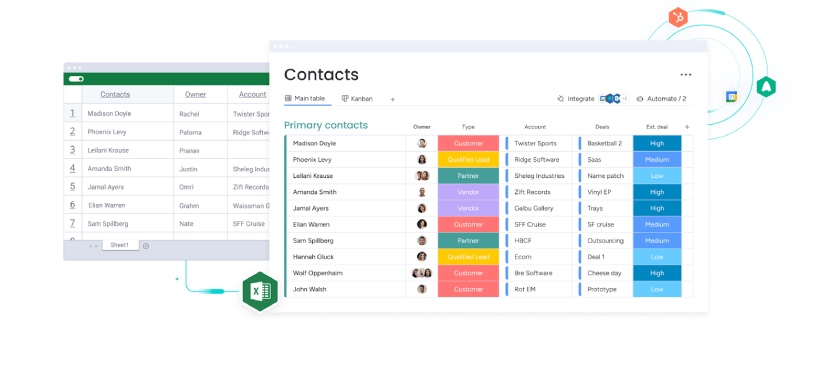
monday CRM’s contact management dashboard features colorful labels for ease-of-use accessing of account details. (Source: monday CRM)
Our Expert Opinion
monday CRM has high usability ratings because of its simple yet highly intuitive interface, making it easy to learn and use even for absolute beginners. We like how small businesses can improve team collaboration and productivity using digital whiteboards, file sharing, and guest access for work boards. We love how users can use Kanban, map, timeline, and calendar view options to access sales data for smarter decision-making.
Bitrix24: Best CRM for Ecommerce & Online Stores

Pros
- It offers comprehensive ecommerce tools like inventory management, storefront builder, and payment processing at no cost.
- It has excellent collaboration tools, like group chats and unlimited time for video calls.
- It has solid project management tools for workload distribution, workflow visualization, and task automation.
Cons
- System interface has a breadth of features, making it overwhelming for beginners and solo users.
- Email marketing capabilities require the Standard plan for $99 (up to 50 users).
- Pricing for paid plans can quickly escalate.
- You’re looking for an ecommerce CRM: Bitrix24 is a popular option for ecommerce operations primarily because of its plethora of tools for online businesses.If you have an online store, you can streamline operations with its inventory management and shipping cost calculator. Improve customer experiences by ensuring smooth checkout with this platform’s payment processing, and boost branding with its storefront builder.
- You want a CRM with robust internal communication tools: An all-in-one solution for small businesses, Bitrix24 can contain business-related activities internally, including communications. Under its Free plan, users can use the chat system for one-on-one and group calls. Plus, use its native video conferencing tool with unlimited call duration for customer support.
- You prefer a simple CRM with a highly intuitive interface: One common issue with Bitrix24 is its saturated interface. For solo users and absolute beginners, the sheer multitude of features can be overwhelming and require a steep learning curve.
- Alternatives: Bigin by Zoho CRM is our recommended small business CRM for solo users for its simplicity and ease of use. Meanwhile, consider monday CRM if you want an intuitive interface with a familiar navigation layout.
- You need to automate your email marketing campaign for free: To access Bitrix24’s email marketing tools, you’ll need to subscribe to the Standard plan for $99 per organization, monthly (up to 50 users). The price can be steep for small businesses on a budget, especially those with fewer than 10 employees.
- Alternatives: HubSpot CRM takes the edge on email marketing automation at no cost. Capsule CRM is another option to look at for its AI assistance in crafting and optimizing emails.
Bitrix24 Pricing Plans*
*Pricing is based on annual billing on a per-month breakdown. Monthly billing and enterprise-level options are available for a higher cost. While we update pricing information regularly, we encourage our readers to check current pricing.
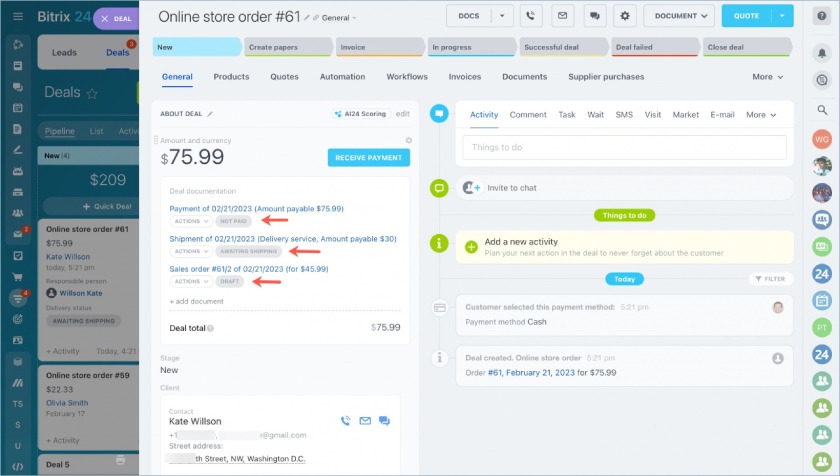
Bitrix24 order processing dashboard shows customer order details like payment, shipment, and sales progress monitoring. (Source: Bitrix24)
Our Expert Opinion
Bitrix24 is a compelling choice for small businesses dealing with ecommerce operations. Its Free plan alone is equipped with features such as the online store builder, order processing, product listings, and checkout scripts.
You can also integrate it into a point-of-sale (POS) system. This makes Bitrix24 one of the best CRMs for retail. Moreover, Bitrix24 is a powerhouse business solution as its capabilities extend to project management, sales automation, and marketing.
Capsule CRM: Best AI Tools for Writing Sales Emails

Pros
- It has free AI Content Assistant for crafting effective sales emails.
- It has built-in project and task management.
- It allows easy integration with accounting apps like Xero and QuickBooks.
Cons
- It lacks advanced email tools like open tracking, which requires integration.
- It lacks ecommerce features like inventory management and purchase order processing.
- Workflow automation features are unavailable until the Growth plan at $36 per user, monthly.
- You want to use an AI-powered CRM for writing sales emails: Capsule CRM’s paid plans (starting at $18 per user, monthly) give you access to its AI content assistant. With this tool, you can draft sales emails from your contact records and get recommendations on the right tone, topic, and even length of your message.
- You’re looking for a basic CRM for easy deal management: Capsule CRM offers basic CRM features like contact management, deal management, and email marketing campaigns. It also has a simple interface that makes it easy for users to manage contacts, calendars, sales, and to-do lists.
- You want a CRM with email tracking features: Capsule CRM offers basic email marketing templates and features but doesn’t have email tracking tools. While you can integrate Capsule CRM with a third-party email analytics app, like Transpond, this could mean additional expense for small business owners.
- Alternative: HubSpot CRM tops our list of the best CRMs for email marketing because of its advanced emailing feature. If you’re looking for an email open tracker, Copper CRM is a great option.
- You need a CRM with marketing and ecommerce capabilities: Capsule CRM lacks features for setting up marketing campaigns and putting them on autopilot. The same can be said for ecommerce features like inventory management, and billing processes.
- Alternative: Bitrix24 offers a comprehensive set of ecommerce features, including an online store builder, a built-in checkout process, and product catalogs.
Bitrix24’s marketing capabilities include websites for marketing teams, marketing automation, and segment-based marketing. Your CRM can also connect with social networks like Instagram and Facebook to reach your leads.
Capsule CRM Pricing Plans*
Capsule CRM Add-on:
- Transpond (marketing automation tools): Starts at $11 per user, monthly
*Pricing is based on annual billing on a monthly, per-user breakdown. Monthly billing is available for a higher cost. While we update pricing information regularly, we encourage our readers to check current pricing.
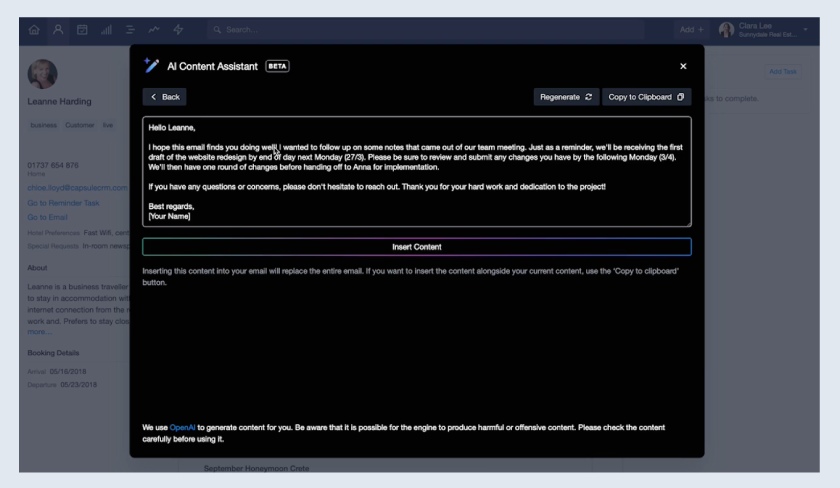
Small business owners can use Capsule CRM’s AI content assistant to quickly create emails for lead outreach and nurturing. (Source: Capsule CRM)
Our Expert Opinion
Capsule CRM sets itself apart from other CRMs for small business teams with its free AI content writing assistant tool. This tool helps small businesses improve their productivity by reducing the time it takes to compose sales emails, making it one of the top AI CRMs. Aside from that, Capsule CRM has high usability ratings, not only for its AI tool but also for its user interface.
Apollo.io: Best CRM Software for Small Businesses That Need Affordable Lead Management Tools

Pros
- Affordable lead generation tools like scores and signal features (e.g., buying intent and AI) are offered.
- It has low-cost lead engagement features with multiple sequential contact points (e.g., email and phone calls).
- Freemium plan has unlimited email credits (10,000 credit limit per account, monthly as per provider’s Fair Use Policy).
Cons
- Marketing features are limited to cold calling and email campaigns; it has no social media, paid ads, or other digital marketing features.
- It’s not a full CRM (only with CRM-like features); it needs to integrate with other CRMs for data sync and feature enrichment.
- It has no phone support; email priority support is available for paid plans only.
- You need affordable lead generation tools: Apollo.io offers lead management tools like autoscore and buying intent starting on its free plan. The buying intent tool lets you easily filter company searches to those leads who expressed interest in your products and services.
With AI-generated lead scoring, you can outline criteria, variables, and weightings that work best for your small business. By combining behavioral and demographic signals, you can quickly build buying signals and generate more leads. Plus, add some talking tips to prepare your team for the conversation.
- You’re looking for low-cost lead engagement tools: Apollo.io offers an AI Writer tool with messaging intelligence to assist reps in crafting email content for lead engagement. Small businesses that use email as a primary communication channel can benefit from this system because it offers unlimited email credits starting with its free plan.
Apollo.io’s AI-powered conversation intelligence capability provides video call insights to managers and reps. It automates manual processes and generates actionable recommendations, helping small businesses create more effective engagement strategies to win more deals.
- You need more robust and advanced digital marketing features: While Apollo.io offers cold calling and email marketing, it lacks other digital marketing features like social media marketing and search engine optimization (SEO). This is a drawback if your company wants to use these strategies for generating marketing-qualified leads.
- Alternatives: HubSpot CRM and Zoho CRM offer free-forever marketing tools for social and email marketing. As you upgrade your plan, you can use more sophisticated marketing features like advanced SEO recommendations and analytics to inform your campaign strategies.
- You want a complete CRM for your small business: Apollo.io is not a complete CRM like HubSpot CRM, Zoho CRM, and Salesforce. However, it integrates with these CRMs to sync data and enhance its capabilities. If you’re good with basic lead generation features, some alternatives have full CRM capabilities.
- Alternatives: Bigin by Zoho CRM and Capsule CRM have a full range of CRM capabilities like lead, account, and client management with free and scalable, paid plans. If you’re a Google Workspace user, then Copper CRM is your best choice.
Apollo.io Pricing Plans*
*Pricing is based on annual billing on a per-user, monthly breakdown of its packages. Monthly billing is available for a higher cost. While we update pricing information regularly, we encourage our readers to check current pricing.
Our Expert Opinion
Apollo.io is the winner in the lead management category because of AI-powered lead-scoring capability with buying intent and signals. Another notable feature is its semiautomated or fully automated sequencing for creating repeatable processes to reach leads. Small businesses can leverage these tools to obtain accurate data and prepare to engage with prospects and customers with greater confidence to close more deals quickly.
Bigin by Zoho CRM: Best for Startups and Solo Users

Pros
- It has free and low-cost subscription options from $7 to $12 per user, monthly.
- It has a built-in phone system.
- It’s ideal for startups and solo users like freelancers and solopreneurs with minimal learning curve because of basic features.
Cons
- Its CRM features are too basic; it lacks advanced marketing, customer support, and sales tools.
- Mass email is not available for free—you’ll need the Express plan for $7 per user, monthly.
- It’s not ideal for growing small businesses with complex business operations like multiple supplier invoicing and territories.
- You are a solopreneur or freelancer needing a free and scalable CRM: Bigin is Zoho’s affordable product CRM version built for small business owners, like freelancers and solopreneurs. Its free plan includes contact management and task automation, making Bigin one of the best personal CRMs.
You can easily connect with your acquaintances with its free built-in telephone and free Bigin Gmail add-on. Its tiers range from $7 to $12 per user, monthly for the Express and Premier plans respectively.
- You’re looking for a free CRM with a built-in telephone system: In addition to being one of the best personal CRMs in the market for offering basic features, Bigin by Zoho CRM stands out for being one of the few products with a built-in phone system. Better yet, the telephone capabilities are available on its freemium plan for placing, receiving, and tracking phone calls from the CRM system.
- You want more sophisticated sales features: Because of the bare-bones focus, Bigin by Zoho CRM lacks advanced sales features like AI analytics, proposal and invoice generation, and automated contact enrichment.
- Alternative: Pipedrive is a powerhouse sales CRM for small business teams that offers more robust direct sales capabilities.
- You need omnichannel capabilities: Bigin by Zoho CRM is limited to communication outreach through telephone, email, and customer engagement on X (formerly Twitter). Therefore, it’s not ideal for mass marketing or using a more general approach to outreach campaigns.
- Alternative: HubSpot CRM has more communication options, including live chat, text, email, and messaging app integrations like Facebook. You can also integrate it with voice-over-internet-protocol (VoIP) providers like AirCall without plugins or extensions. Small businesses can use this CRM for customer service and sales support to win more deals without hurting the budget.
Bigin by Zoho CRM Pricing Plans*
Bigin Add-ons for Paid Plans:
- One-time Data Backup: $5 per request
- Additional File Storage: $4 for 5GB per month
- Email Templates: $1 per month, per five additional templates
- Automations or Workflows: $1 per month, per additional workflow or automation
- Forms: $1 per month, per additional form
*Pricing is based on annual billing on a per-month breakdown of the plans. Monthly billing is available for a higher cost. While we update pricing information regularly, we encourage our readers to check current pricing.
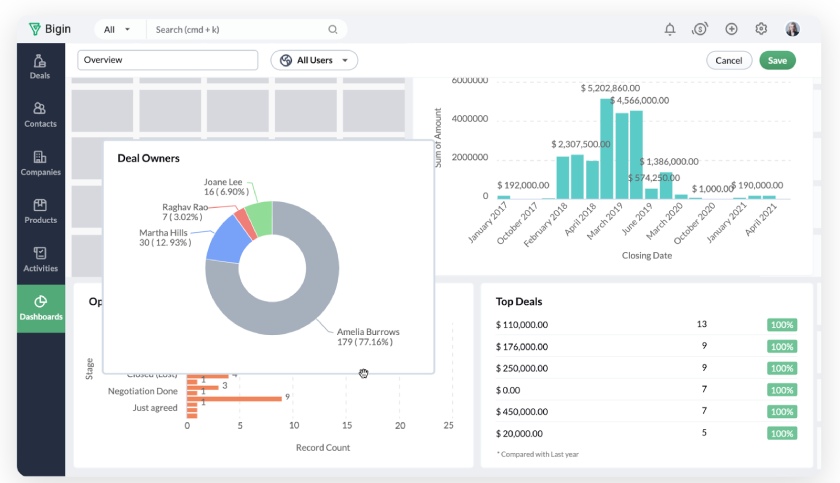
Bigin’s CRM dashboard supports seamless deal management with charts for deals by owner, top deals, and more. (Source: Bigin by Zoho CRM)
Our Expert Opinion
Bigin by Zoho CRM is a clear frontrunner for CRMs that freelancers and solo-operated businesses can use for its affordability and usefulness. It’s designed to provide the basic CRM system for absolute beginners and those with less complex sales processes. When the business is ready, teams can easily upgrade to the native Zoho CRM for broader, more advanced capabilities that include lead qualification, quotes, and account linking.
Insightly CRM: Best for Project Management & Delivery
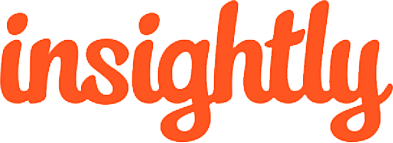
Pros
- It has built-in features for project management across all plans.
- Contact management tools have relationship linking, data storage, and activity tracking.
- It has highly customizable sales workflows.
Cons
- It lacks social media capabilities.
- It lacks tools for revenue operations.
- It has no free plan, only 14-day free trial.
- You run a startup or project-based business: This platform is one of the best CRMs small business teams can use to manage tasks and projects. Its project management and delivery tools are available across all plans, making it one of the best CRMs for freelancers.
Moreover, marketing agencies and software development companies can leverage its features for collaboration, workflow building, and milestone tracking to monitor the progress of their projects.
- You require a CRM with record-linking capabilities for referral marketing: Insightly CRM’s Plus plan allows you to link contact records to label B2B relationships. This makes it easy to trace referrals and connections between your leads, customers, and companies in your CRM records.
Insightly’s solid contact management system with record-linking makes it one of the top operational CRM platforms. It’s suitable for B2B sales and customer service teams who want to streamline their lead and client management processes.
- You want a small business CRM software with solid social media functionalities: Insightly CRM lacks social media engagement, management, and profile enrichment capabilities. This is a downside for solopreneurs and small business owners wanting to leverage social media for lead nurturing, marketing, sales, and even customer service.
- Alternatives: HubSpot CRM and Capsule CRM are two of the best social CRM systems for small businesses. If you want to capture and engage with leads and clients through platforms like Facebook, you can do so using either CRM.
- You’re looking for a CRM with more robust tools for revenue operations: Insightly CRM is one of the best operational CRM software for its contact management features. However, a revenue operations team requires more robust tools like e-signature, payment processing, and invoicing.
- Alternative: HubSpot CRM is a robust general-use CRM that includes Stripe payment processing, quote generation, document storage, and activity and performance reporting on its free plan. As you upgrade your plan to a paid version, you can use its e-signature feature and other advanced tools for revenue management (starting at $15 per user, monthly).
Insightly CRM Pricing Plans*
Insightly CRM Add-ons:
*Pricing is based on annual billing on a per-month basis. Monthly billing is available for a higher cost. While we update pricing information regularly, we encourage our readers to check current pricing.
Our Expert Opinion
Insightly CRM offers an excellent set of task and project management features across all plans, including the free tier. You can collaborate on tasks and opportunities and customize your pipeline stages. In addition, you can convert closed deals into projects, allowing you to view the contact details, records, and tasks relevant to the new post-sale project.
Copper CRM: Best Productivity Tools for Google Users

Pros
- Productivity tools like notes, reminders, and team collaboration are included in the most basic plan (Starter at $9 per user, monthly).
- It’s ideal for Google users because of its unique Google Chrome extension and Google product integrations.
- It has easy-to-use and relatively low-cost CRM plans with decent feature lineups.
Cons
- It has no freemium plan, only a 14-day free trial.
- It has no built-in telephony; activating voice calls requires third-party integration like JustCall.
- Revenue tracking and email tools like bulk email, open tracking, and automation start in the Professional plan ($59 per user, monthly).
- You need affordable productivity tools: Copper CRM is equipped with productivity tools in its Starter plan ($9 per user, monthly) for more efficient overall operations. Sales reps avoid missing out on important information with built-in notes and reminders.
You can easily reach out to your prospects, follow up on sales proposals, and launch email marketing campaigns seamlessly with email templates. Meanwhile, sales managers can leverage activity feed, team collaboration, and teammate suggestions to monitor performance and boost productivity and teamwork.
- Your small business mostly uses Google apps: Copper CRM is one of the top Google CRM systems because of its similar Google interface, enhancing productivity and relationships. Easily manage leads, capture customer interactions, and close more deals straight from your Gmail and Google Calendar. With Google Sheets and Drive integration, you can automate tasks, like data entry, so you can focus more on selling.
- You have a startup business and want to try free-forever tools: If you are an independent contractor, freelancer, or startup, Copper CRM is one of the easiest CRM systems you can use. But if you prefer to start with free tools, this CRM falls short. The provider only offers a 14-day free trial to access most features.
- Alternative: HubSpot CRM provides free-forever tools for up to two users with activity and pipeline tracking, prospecting, and list segmentation tools. Bitrix24 is another great option, as it offers a free plan for unlimited users with a client management module. Capsule CRM offers a freemium plan for two users with basic project management tools.
- You need built-in telephony for your small business: Copper CRM doesn’t have a built-in telephony system. You can only make and receive phone calls by integrating this CRM with third-party apps like JustCall or Ringover.
- Alternative: Bigin by Zoho CRM has built-in telephony, allowing reps to answer and make outbound calls using a browser. Sales teams can also make and receive calls using a custom phone or agent phone.
Copper CRM Pricing Plans*
*Pricing is based on annual billing on a per-user, monthly breakdown. Monthly billing is available for a higher cost. While we update pricing information regularly, we encourage our readers to check the current pricing.
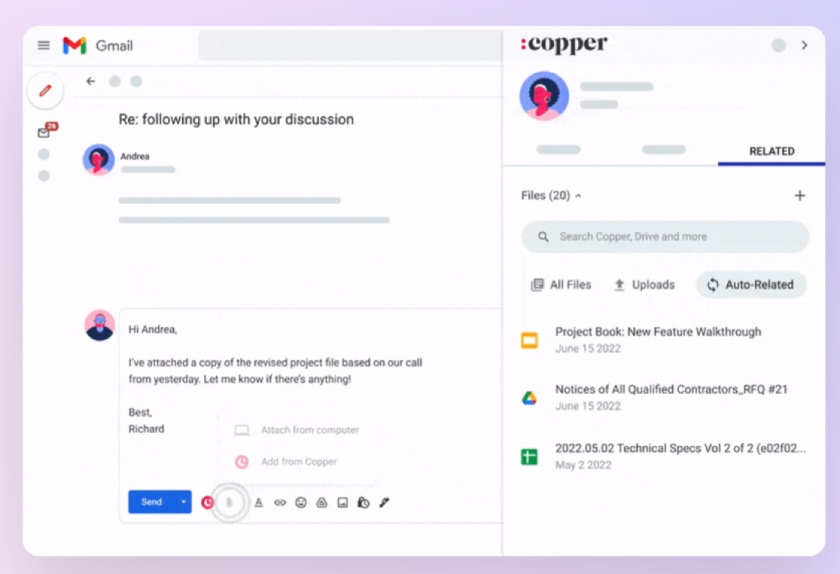
Copper CRM’s native Google Workspace integration enables sales reps to nurture prospects and close deals straight from Gmail. (Source: Copper CRM)
Our Expert Opinion
Copper CRM is undoubtedly a winner in boosting productivity because of its notable features like reminders, notes, and team collaboration capabilities. This easy-to-use CRM is specifically made for Google users. We love how you can seamlessly integrate and use this CRM with Google products to collaborate with your team and engage with customers. Plus, capture publicly available information like social profiles to generate and nurture sales leads quickly.
How We Evaluated the Best CRM for Small Businesses
To determine the best CRM software for small business teams, we evaluated each platform for overall affordability, feature capabilities, ease of use, and the value an organization can obtain from the software.
We also looked at customer support options offered by the provider and how each CRM platform performs in terms of product intuitiveness and user experience. We also apply these considerations when we assess the best CRM alternatives.
20% of Overall Score
Since small businesses and startups are usually on a tight budget, pricing was an important evaluation factor. This considered the availability of a free-forever plan and affordable pricing options that are cost-friendly and scalable for growing businesses. Finally, we looked at options for subscribers to pay monthly or save by paying annually when we evaluated the best small business CRM systems.
25% of Overall Score
General features refer to baseline capabilities to help a small business get value from its software. Robust system customization, for example, lets a team tailor their product to meet their unique operational needs. We also wanted the best small business CRM software provider to offer a mobile app for on-the-go sales, a wide range of integration options to extend the CRM functionality, and solid reporting and analytics tools.
20% of Overall Score
This criterion looked at advanced features that give a small business CRM solutions provider a slight boost and stronger capabilities. Sophisticated marketing automation, for instance, allows you to create and deploy email, advertising, and social media campaigns to mass audiences. We also examined the built-in AI, revenue forecasting, and pipeline analytics features of CRM solutions for small business teams.
10% of Overall Score
Based on our personal experience of using CRM platforms for small businesses and testimonials from third-party review sites, we assessed the intuitiveness of each provider’s interface. We considered the simplicity of the navigation setup, feature organization, built-in automation, and onboarding implementation.
15% of Overall Score
Excellent customer support helps prevent poor user experiences or technical issues. So we examined the best CRM tools for small businesses for their customer service hours and the availability of support via phone, live chat, and email. We also looked at self-service resources users can access, like knowledge base articles, tutorials, user forums, and FAQ pages.
10% of Overall Score
In addition to firsthand experience with these best CRMs for small businesses, we looked into what actual users say about each provider according to online reviews from trusted sites. This category helps us better understand how users feel about the product’s features, platform ease of use, and value customers feel the gain from each CRM.
How to Choose the Best Small Business CRM
Unlike large businesses and enterprises that use a comprehensive set of business tools, small businesses can make do with a tiny pool of software functionalities that keep the operation up and running. That said, choosing the best CRM tools for small businesses has to be tailored to teams based on factors, such as the following:
- Business needs and goals: Understand your priorities and specific goals before deciding on a CRM solution. For example, if you plan to increase lead conversion rates, look for features that support this goal, like opportunity management tools and lead scoring automation.
- Team size: When screening CRM options for small businesses, consider the number of users you have. If you’re a startup or a solopreneur, it makes more sense to choose a basic CRM system than one with extensive features you may not get to use.
- Adoption capability: Assess your team’s learning capacity and comfort when using new software. If they are absolute beginners, an intuitive CRM is the way to go. The interface and navigation setup are easier to follow, and the pop-up guides provide additional help. Plus, it’s crucial to know if the provider offers training and onboarding.
- Budget: Decide how much you’re willing to spend on the software. In doing so, determine if you have the bandwidth to operate a paid plan at full scale. Otherwise, testing the waters through a free trial or starting with a free-forever plan should be your first step.
- Scalability: As your small business grows, you will likely scale your CRM system. Does it have sensible features and additional capacity to support your upgrade? How much does it cost to move up to a higher-tiered paid plan?
You can create your own criteria for deciding on the CRM software for your business. Check out our guide on how to choose a CRM system, and don’t miss the free template to help you identify the specific tools your business needs.
Frequently Asked Questions (FAQs)
All CRM solutions on our list offer free or affordable plans for small businesses. The CRMs that offer both affordable plans and a free-forever option include HubSpot CRM, Bitrix24, Bigin by Zoho, and monday CRM.
Based on our evaluation, HubSpot CRM is the best overall small business CRM software. However, certain CRMs may be a better fit depending on feature and product attribute requirements. Pipedrive, for example, offers advanced sales automation tools, while Bitrix24 has robust ecommerce tools at no cost.
Your small business CRM should include features that help your company stay organized and grow. At a minimum, it should have contact data storage, email and phone communication capabilities, pipeline tracking, and solid reporting tools. Additionally, you should be able to manage sales and marketing on the go through a mobile app and have the ability to customize your system’s data fields, pages, and modules to meet your operational needs.
Yes. Small businesses should use a CRM system to streamline sales, marketing, and service operations and save money. The best CRM for small businesses is equipped with automation, analytics, reporting, AI, and other helpful features that can improve efficiency and productivity.
Bottom Line
The best CRM for small business teams is affordable, easy to use, and includes solid features for storing data, managing deals and sales opportunities, implementing marketing campaigns, and supporting customers.
While HubSpot CRM is our pick for the best CRM software for a small business, other systems may better suit your business needs. For instance, Pipedrive is great for sales automation, while Bigin has useful basic tools for solopreneurs and freelancers.






